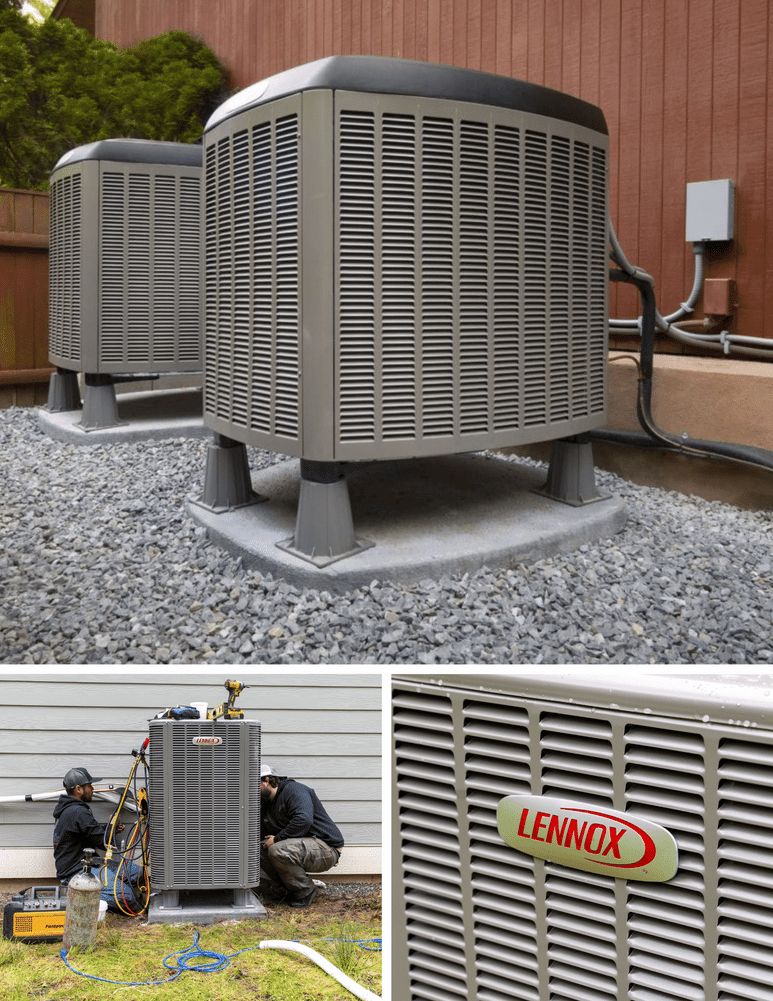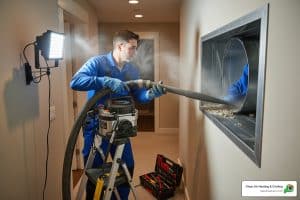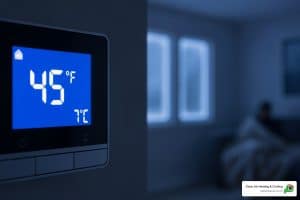Understanding Heat Pumps vs HVAC Systems: A Beginner’s Guide
When it comes to managing the comfort of your home, it’s important to understand the differences between heat pumps vs HVAC systems. This quick guide will help you decide which option is best for your needs without diving into all the details.
Key Points:
- Heat Pumps:
- Provide both heating and cooling.
- More energy-efficient but may struggle in very cold climates.
- Higher upfront cost but potential savings on utility bills.
- HVAC Systems:
- Typically include separate units for heating (furnace) and cooling (AC).
- Perform well in extreme cold with gas furnaces.
- Lower initial cost but may be less efficient.
Heat pumps and HVAC systems offer unique benefits. Your choice depends on your climate, budget, and energy preferences. For homeowners in Whatcom, Skagit, and Snohomish County, Clean Air Heating & Cooling provides professional assessments to ensure you pick the right system.
Ready to learn more? Let’s dive into the specifics of each system, starting with what exactly a heat pump is and how it works.
What is a Heat Pump?
A heat pump is a versatile HVAC system that can both heat and cool your home using a single unit. This makes it a dual-purpose solution, ideal for homeowners who want an all-in-one system.
How Does a Heat Pump Work?
Heat pumps operate using a refrigerant, a special fluid that absorbs and releases heat. Here’s a simplified breakdown of the process:
- Heating Mode: In colder months, the heat pump extracts heat from the outdoor air and transfers it inside. The refrigerant absorbs this heat, and a compressor increases its temperature. The warm refrigerant then circulates through indoor coils, releasing heat into your home.
- Cooling Mode: In warmer months, the process reverses. The heat pump extracts heat from inside your home and releases it outside. The refrigerant absorbs indoor heat and carries it to the outdoor unit, where it is expelled.
Eco-Friendly and Efficient
One of the standout features of heat pumps is their eco-friendliness. Unlike traditional heating systems that burn fossil fuels, heat pumps use electricity to transfer heat. This method is much more efficient and reduces greenhouse gas emissions. According to Clean Air Heating & Cooling, heat pumps are three to five times more efficient than average fossil-fueled HVAC systems.
Electric Heat Strip
For those particularly cold days when the temperature drops below 30 degrees, some heat pumps come equipped with an electric heat strip. This component provides additional warmth by using electric resistance heating, ensuring your home stays comfortable even in freezing conditions.
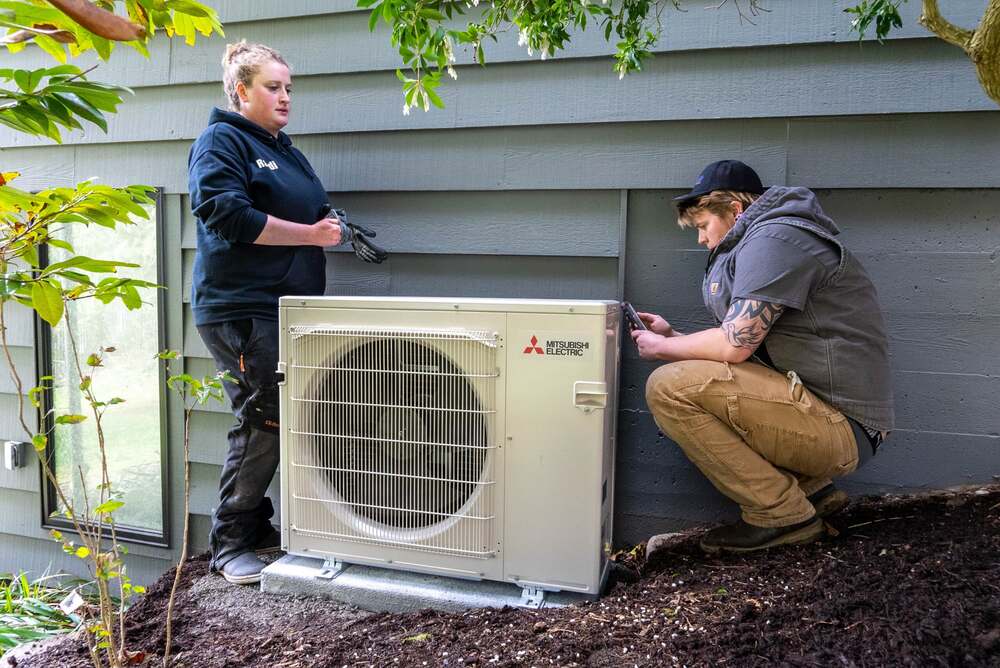
Types of Heat Pumps
There are different types of heat pumps, each drawing energy from various sources:
- Air-Source Heat Pumps: These are the most common and draw heat from the outdoor air.
- Water-Source Heat Pumps: These use water as a heat source.
- Geothermal Heat Pumps: These extract heat from the ground, offering high efficiency but at a higher installation cost.
Why Choose a Heat Pump?
Benefits:
- Energy Efficiency: High efficiency due to heat transfer rather than generation.
- Dual Functionality: Provides both heating and cooling.
- Environmentally Friendly: Lower greenhouse gas emissions.
- Uniform Heating: Even distribution of heat throughout the home.
- Longevity: Typically lasts 20-25 years with proper maintenance.
Drawbacks:
- Initial Cost: Higher upfront cost compared to traditional systems.
- Climate Sensitivity: Less effective in extremely cold temperatures.
- Space Requirements: Needs ample outdoor space for installation.
For more details on how heat pumps work and their benefits, check out this comprehensive guide.
Now that we’ve covered heat pumps, let’s move on to understanding what an HVAC system entails and how it differs from a heat pump.
What is an HVAC System?
An HVAC system stands for Heating, Ventilation, and Air Conditioning. It’s designed to provide year-round comfort by regulating the temperature and air quality in your home.
Components of an HVAC System
An HVAC system is made up of several essential parts:
- Furnace: Provides heating, usually powered by gas, oil, or electricity.
- Air Conditioner: Cools the home by removing warm air and replacing it with cooler air.
- Ventilation System: Includes ducts, vents, and filters to circulate and clean the air.
- Thermostat: Controls the temperature by signaling the HVAC system to heat or cool the home.
- Air Handler Unit (AHU): Distributes conditioned air throughout the home.
Heating and Cooling
Traditional HVAC systems often have separate units for heating and cooling. The furnace heats the home during the winter, while the air conditioner cools it during the summer. This dual-system approach ensures that each component can operate at its peak efficiency during its respective season.
Ventilation
The ventilation part of an HVAC system is crucial for maintaining indoor air quality. It helps to:
- Remove stale air
- Introduce fresh air
- Control humidity levels
Traditional Setup
In a traditional HVAC setup, the furnace and air conditioner are separate units, often located in different parts of the home. The air handler and ductwork distribute the conditioned air throughout the house. This setup allows for more flexibility in choosing fuel sources and can be more reliable in extreme temperatures.
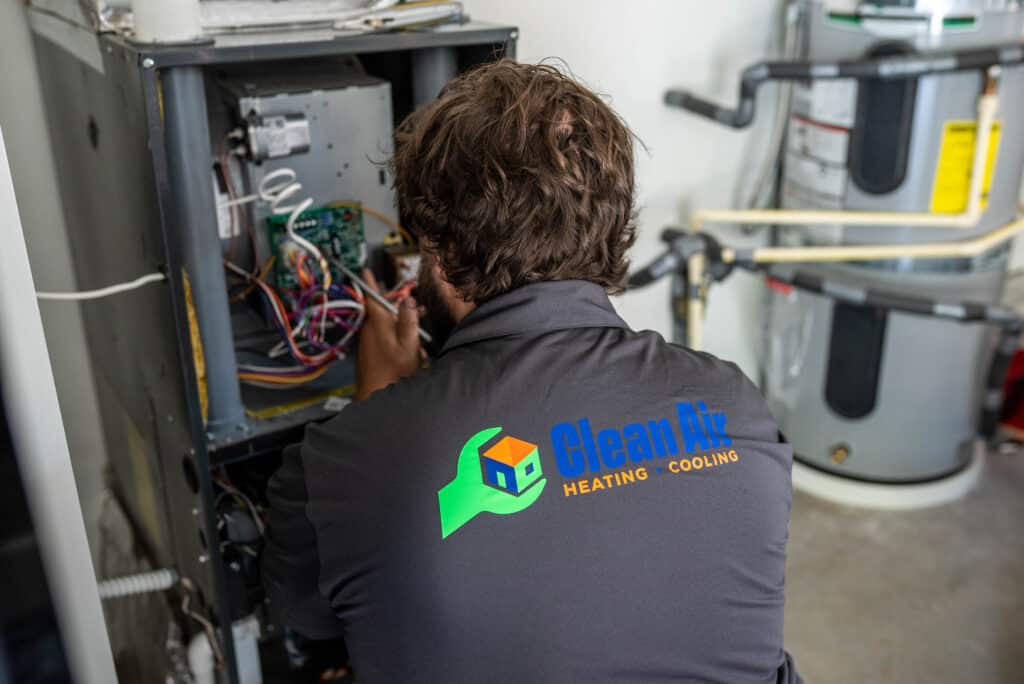
Key Takeaways
- Heating: Done by a furnace.
- Cooling: Managed by an air conditioner.
- Ventilation: Ensures air quality and humidity control.
- Traditional Setup: Separate units for heating and cooling, connected by ductwork.
Understanding these basics will help you better compare heat pumps vs HVAC systems in the next sections. Let’s dive deeper into the key differences between these two systems.
Heat Pump vs HVAC: Key Differences
When comparing heat pumps vs HVAC systems, understand how each system operates and their unique features. Let’s break down the key differences.
Heating and Cooling
Heat Pumps:
- Dual Functionality: Heat pumps can both heat and cool your home. In the summer, they move hot air out of your home to cool it. In the winter, they pull heat from outside air and pump it inside.
- Reversing Valve: This critical component allows the heat pump to switch between heating and cooling modes by reversing the flow of refrigerant.
HVAC Systems:
- Separate Units: Traditional HVAC systems typically consist of a furnace for heating and an air conditioner for cooling. These units operate independently.
- Fossil Fuels: Furnaces often use natural gas, propane, or oil, which can be more effective in very cold climates but less eco-friendly.
Energy Efficiency
Heat Pumps:
- Energy Transfer: Heat pumps are more energy-efficient because they transfer heat rather than generate it. This process uses less electricity.
- SEER and HSPF Ratings: SEER (Seasonal Energy Efficiency Ratio) measures cooling efficiency, while HSPF (Heating Seasonal Performance Factor) measures heating efficiency. Higher ratings mean better efficiency. For example, a heat pump with a SEER rating of 20 and HSPF rating of 10 is highly efficient.
- Environmental Impact: Heat pumps can reduce greenhouse gas emissions, especially when paired with renewable energy sources.
HVAC Systems:
- Energy Consumption: Traditional HVAC systems can be less efficient because they rely on burning fossil fuels for heating and use separate systems for cooling.
- SEER Ratings: Like heat pumps, air conditioners in HVAC systems also have SEER ratings. Higher SEER ratings indicate better efficiency, but this only applies to cooling.
Cost Considerations
Heat Pumps:
- Initial Cost: Higher upfront costs due to the dual functionality and advanced technology.
- Long-Term Savings: Lower utility bills over time due to higher energy efficiency.
HVAC Systems:
- Initial Cost: Generally lower initial costs since you can install a furnace or air conditioner separately.
- Fuel Costs: Ongoing costs can be higher, especially if using fossil fuels for heating.
Climate and Performance
- Moderate Climates: Ideal for regions with mild winters. They can struggle in extremely cold temperatures, although modern models with auxiliary heat can help.
- Innovations: Recent advancements, like the DOE’s Cold Climate Heat Pump (CCHP) Technology Challenge, aim to improve performance in subzero temperatures.
HVAC Systems:
- Extreme Cold: More reliable in very cold climates due to the efficiency of furnaces burning fossil fuels.
- Versatility: Can be customized with different fuel options and separate heating and cooling units.
By understanding these key differences, you can make a more informed decision when choosing between a heat pump and an HVAC system for your home. Next, let’s explore the pros and cons of each system.
Pros and Cons of Heat Pumps
When considering whether a heat pump is right for your home, it’s important to weigh the pros and cons. Let’s dive into the details.
Energy Efficiency
Pros: Heat pumps are known for their energy efficiency. They transfer heat rather than generate it, using less electricity compared to traditional HVAC systems. For every unit of electricity consumed, they can produce up to three units of heat. This efficiency can lead to significant savings on energy bills.
Cons: The efficiency of heat pumps can drop in extremely cold climates. When temperatures dip below freezing, the system may need to rely on an auxiliary heat source, which can increase energy consumption.
Dual Functionality
Pros: One of the biggest advantages of heat pumps is their dual functionality. They can both heat and cool your home, eliminating the need for separate systems. This can save space and reduce installation costs.
Cons: Because they operate year-round, heat pumps may have a shorter lifespan compared to systems that only handle heating or cooling. This means you might need to replace them more frequently.
Greenhouse Gas Emissions
Pros: Heat pumps are generally more environmentally friendly. They don’t burn fossil fuels, which means they produce fewer greenhouse gas emissions. This makes them a great choice for eco-conscious homeowners.
Cons: While heat pumps themselves are eco-friendly, their environmental impact can vary depending on the electricity source. If your electricity comes from coal or other non-renewable sources, the overall benefit may be reduced.
Initial Cost
Pros: Over time, the energy savings from a heat pump can offset the initial investment, making them cost-effective in the long run.
Cons: The upfront cost of a heat pump can be higher than traditional HVAC systems. Prices can range from $1,500 to $10,000, depending on the type and size of the unit. Installation can also be complex and costly.
Climate Sensitivity
Pros: Heat pumps are highly efficient in moderate climates. They can maintain comfortable indoor temperatures without consuming a lot of energy.
Cons: In colder climates, heat pumps may struggle to provide sufficient heat. When temperatures drop below 30 degrees Fahrenheit, they may need an auxiliary heating source, which can increase costs and reduce efficiency.
Space Requirements
Pros: Heat pumps can save space by combining heating and cooling functions into one system. This can be particularly beneficial for smaller homes.
Cons: Some heat pump systems, like geothermal models, require significant space for installation. This can be a limitation for homeowners with smaller properties.
By understanding these pros and cons, you can better evaluate whether a heat pump is the right choice for your home. Next, we’ll explore the pros and cons of traditional HVAC systems.
Pros and Cons of HVAC Systems
Functionality in Extreme Cold
Pros: Traditional HVAC systems, especially those with gas furnaces, excel in extremely cold temperatures. They provide more consistent and potent heat compared to heat pumps, which can struggle when the mercury dips too low.
Cons: This robust heating capability comes at a cost. HVAC systems often consume more energy, especially in harsh climates.
Lifespan
Pros: Traditional HVAC systems, when used seasonally (furnace in winter, AC in summer), tend to have a longer lifespan. Air conditioners typically last about 15-20 years, depending on maintenance. This can be longer than heat pumps, which operate year-round.
Cons: Despite their longevity, HVAC systems still require regular maintenance to achieve their full lifespan. Neglect can lead to costly repairs or early replacement.
Separate Systems
Pros: With HVAC systems, heating and cooling are separated into two units. If one part breaks down (e.g., the furnace), the other part (e.g., the air conditioner) might still be operational. This redundancy can be a lifesaver during extreme weather.
Cons: Having separate systems can also mean double the maintenance and potential repair costs. Each unit needs its own upkeep, which can add up over time.
Fuel Choice
Pros: HVAC systems offer flexibility in fuel choice. You can choose between natural gas, oil, or electricity, depending on what’s more economical or available in your area. This adaptability can be advantageous in regions with varying energy costs.
Cons: This flexibility can sometimes lead to higher installation costs, especially if switching from one fuel type to another. Additionally, fuel prices can be volatile, affecting long-term operating costs.
Performance
Pros: Gas furnaces in HVAC systems can heat spaces rapidly and are very economical in areas with cheap and reliable natural gas. They are also well-suited for larger homes that require powerful heating.
Cons: While performance is strong, the environmental impact of burning fossil fuels is a significant drawback. Gas furnaces contribute to greenhouse gas emissions, which isn’t ideal for eco-conscious homeowners.
Maintenance
Pros: HVAC systems are well-understood by most technicians, making it easier to find skilled professionals for maintenance and repairs. Regular maintenance can keep the system running efficiently and extend its lifespan.
Cons: HVAC units require a significant amount of maintenance to last. Filters need changing, ducts need cleaning, and both the furnace and air conditioner require periodic check-ups. This ongoing maintenance can be time-consuming and costly.
Understanding these pros and cons can help you decide whether an HVAC system is the right fit for your home. Next, we’ll delve into the cost comparison of heat pumps versus HVAC systems.
Cost Comparison: Heat Pump vs HVAC
When comparing heat pumps vs HVAC systems, it’s crucial to consider both the initial and long-term costs. Let’s break down the key factors:
Initial Costs
Heat Pump:
The initial cost of a heat pump can range from $1,500 to $10,000 depending on the type (air-source, water-source, or geothermal) and the size of the unit. Geothermal heat pumps are the most expensive due to the need for drilling.
HVAC System:
An HVAC system, which includes a furnace and an air conditioner, typically costs between $7,000 and $12,500. The price varies based on the type of furnace (electric, gas, or oil) and the size of the air conditioning unit.
Installation Costs
Heat Pump:
Installation can be labor-intensive, especially for geothermal systems, which require extensive ground work. On average, installation costs range from $2,000 to $5,000.
HVAC System:
The installation cost for an HVAC system is generally lower, averaging around $3,000 to $6,000. However, if your home lacks existing ductwork, this can add significantly to the cost.
Long-Term Savings
Heat Pump:
Heat pumps are highly efficient and can lead to substantial energy savings over time. Homeowners often see a reduction in their monthly energy bills, especially in moderate climates. The dual functionality (heating and cooling) also means you only maintain one system.
HVAC System:
While traditional HVAC systems might have lower initial costs, they can be more expensive to operate. Furnaces, particularly gas ones, can be economical in areas with cheap natural gas but may not offer the same energy efficiency as heat pumps.
Tax Rebates
Both heat pumps and HVAC systems can qualify for tax rebates and incentives, particularly if they are Energy Star certified. These rebates can significantly offset the initial and installation costs.
Ductwork
If your home already has ductwork, both systems can use it, which keeps installation costs lower. If not, adding ductwork can be expensive and disruptive.
Hybrid Systems
Some homeowners opt for hybrid systems, combining a heat pump with a traditional furnace. This setup allows the heat pump to handle moderate temperatures efficiently, while the furnace kicks in during extreme cold. Hybrid systems can offer the best of both worlds but come with higher initial and installation costs.
By considering these factors, you can make a more informed decision about which system fits your budget and long-term needs.
Next, we’ll explore the energy efficiency of heat pumps compared to HVAC systems.
Energy Efficiency: Heat Pump vs HVAC
When comparing the energy efficiency of a heat pump vs HVAC system, several factors come into play. Understanding these can help you choose the best option for your home.
SEER and HSPF Ratings
SEER (Seasonal Energy Efficiency Ratio) measures how efficiently a cooling system operates over a typical cooling season. The higher the SEER rating, the more efficient the system. HSPF (Heating Seasonal Performance Factor), on the other hand, measures the efficiency of heat pumps in heating mode. Higher HSPF ratings indicate better efficiency.
For example, a heat pump with a SEER rating of 18 and an HSPF rating of 10 will be more energy-efficient than a system with lower ratings.
Performance in Moderate Climates
Heat pumps are particularly efficient in moderate climates. They can provide both heating and cooling by transferring heat rather than generating it. This process uses less energy compared to traditional HVAC systems, which often rely on burning fossil fuels.
According to the U.S. Department of Energy, air-source heat pumps can reduce electricity usage for heating by up to 50% compared to electric resistance heating.
Extremely Cold Temperatures
In extremely cold temperatures, heat pumps become less efficient. When the temperature drops below 30 degrees Fahrenheit, the system often uses auxiliary heat to maintain warmth. This can increase energy consumption and reduce efficiency.
For those in colder climates, a hybrid system might be more efficient. It combines a heat pump with a traditional furnace, using the furnace only when it’s too cold for the heat pump to work efficiently.
Energy Star Models
Both heat pumps and traditional HVAC systems come in Energy Star-rated models. These models meet strict energy efficiency guidelines set by the U.S. Environmental Protection Agency. Choosing an Energy Star-rated model can result in significant energy savings over time.
For instance, an Energy Star-rated heat pump can save homeowners up to 20% on heating and cooling costs according to the Energy Star program.
By understanding these key factors, you can make a more informed decision about which system will be most energy-efficient for your home.
Next, let’s delve into the longevity and maintenance of heat pumps versus HVAC systems.
Longevity and Maintenance
When comparing a heat pump vs HVAC, understanding their lifespan and maintenance needs is crucial. These factors can significantly impact your long-term satisfaction and costs.
Life Span
Heat Pumps
Heat pumps generally last between 15 to 20 years. In mild climates, they can even stretch to 25 years. However, in coastal regions, their lifespan might shorten to around 10 years due to harsher environmental conditions.
HVAC Systems
Traditional HVAC systems, including separate air conditioners and furnaces, typically have a lifespan of 15 to 20 years. Air conditioners alone can last up to 15-20 years, while furnaces can last even longer, up to 30 years with proper maintenance.
Maintenance Requirements
Heat Pumps
Heat pumps need annual maintenance if used seasonally, and bi-annual check-ups if used year-round. Homeowners can perform simple tasks like:
- Checking for snow or ice buildup in winter.
- Removing leaves and debris.
- Ensuring the unit is elevated and away from leaky gutters.
- Changing or cleaning filters.
- Keeping registers open.
- Cleaning dirty outdoor coils.
A professional technician will handle more detailed tasks such as:
- Checking ducts, filters, blowers, and coils.
- Inspecting air flow and refrigerant levels.
- Checking electrical terminals.
- Lubricating motors and checking belts.
- Inspecting controls and thermostat sensors.
HVAC Systems
For HVAC systems, a professional inspection in both spring and fall is advisable. Homeowners can:
- Replace air filters monthly or every other month.
- Clean coils.
- Check drain lines and pans.
- Inspect electrical connections.
- Ensure air registers and ducts are clean.
Professional technicians will perform tasks like:
- Checking thermostat settings.
- Inspecting electrical connections.
- Lubricating belts and fans.
- Clearing drain lines.
- Checking for refrigerant leaks and recharging refrigerant if needed.
Professional Installation
Both heat pumps and traditional HVAC systems should ideally be installed by professionals. Improper installation can lead to inefficiencies and potential damage. A professional ensures that the system is correctly sized and installed for your home, maximizing its efficiency and lifespan.
Warranty Considerations
Heat Pumps
Warranties for heat pumps typically range from 5 to 10 years. Some manufacturers offer extended warranties if the unit is registered shortly after installation.
HVAC Systems
Warranties for HVAC systems can vary widely. Air conditioners and furnaces often come with warranties ranging from 10 to 15 years, depending on the manufacturer. Extended warranties are also available, and regular maintenance is often a requirement to keep the warranty valid.
Understanding these aspects of longevity and maintenance can help you make an informed decision about which system is right for your home.
Next, let’s explore how to choose the right system for your specific needs.
Choosing the Right System for Your Home
When deciding between a heat pump and an HVAC system, several factors come into play. Here’s what you need to consider:
Climate
Climate is the most crucial factor. Heat pumps are ideal for moderate climates, where temperatures don’t drop below freezing often. They provide both heating and cooling efficiently. However, in regions with harsh winters, a traditional HVAC system might be more reliable. “Heat pumps don’t work well in climates that experience freezing weather,” notes a Forbes article.
Budget
Your budget is another critical consideration. Heat pumps can be more expensive initially, with prices ranging from $1,500 to $10,000. In contrast, air conditioners typically cost between $3,000 and $7,000. However, heat pumps often save money in the long run due to their energy efficiency.
Energy Savings
If energy savings are a priority, heat pumps generally come out on top. They are highly efficient because they transfer heat rather than generate it. According to Raleigh Heating & Air, the best heat pumps use five times less energy in cooling mode than in heating mode. Look for ENERGY STAR® certified models for maximum efficiency.
Heating and Cooling Needs
Consider your home’s heating and cooling needs. Heat pumps offer dual functionality, providing both heating and cooling from one unit. This can be a significant advantage in terms of space and convenience. However, if your home experiences extreme cold, you might need a supplemental heating source, making a traditional HVAC system more practical.
Professional Consultation
Finally, a professional consultation is invaluable. A trained HVAC expert can assess your home’s specific needs, climate, and budget to recommend the best option. Local experts, like Clean Air Heating & Cooling, can provide this service, ensuring you make an informed decision.
Next, we’ll address some frequently asked questions about choosing between a heat pump and an HVAC system.
Frequently Asked Questions about Heat Pump vs HVAC
Which is better: a heat pump or HVAC system?
The answer depends on your needs and location.
Heat pumps are great for areas with moderate climates. They can both heat and cool your home efficiently. For example, in the South, where winters are mild, a heat pump can be very effective. They are also more energy-efficient because they transfer heat rather than generate it.
HVAC systems, on the other hand, are more versatile in extremely cold climates. They usually consist of a separate furnace and air conditioner. This setup can handle harsh winters better than a heat pump alone.
TL;DR: If you live in a milder climate, a heat pump is often the better choice. For colder regions, an HVAC system may be more reliable.
What are the downsides to a heat pump?
While heat pumps have many advantages, they do come with some downsides:
- Initial Cost: Heat pumps can be expensive to purchase and install.
- Climate Sensitivity: They are less efficient in extremely cold weather and may require a supplemental heating source.
- Space Requirements: Heat pumps need a lot of outdoor space for installation.
- Electricity Dependency: They can’t function without electricity, which could be a problem during power outages.
If these factors are significant concerns for you, an HVAC system might be a better fit.
How do I decide between a heat pump and an HVAC system?
Choosing between a heat pump and an HVAC system involves several factors:
- Climate: If you live in a milder climate, a heat pump is usually more efficient. For colder climates, an HVAC system is more reliable.
- Budget: Consider both initial and long-term costs. Heat pumps can save on energy bills but have a higher upfront cost.
- Space: Ensure you have enough outdoor space for a heat pump installation.
- Energy Savings: Heat pumps are generally more energy-efficient, which can result in long-term savings.
- Heating and Cooling Needs: Assess your home’s specific needs. A professional consultation can help you decide.
For the best advice, consult with a local expert like Clean Air Heating & Cooling. They can assess your home and recommend the ideal system for your needs.
Conclusion
In summary, deciding between a heat pump vs HVAC system depends on various factors like climate, budget, and your home’s heating and cooling needs. Heat pumps offer excellent energy efficiency and dual functionality, making them a great choice for many homeowners. However, they may not perform as well in extremely cold climates and can have higher initial costs.
On the other hand, traditional HVAC systems are reliable and can be more effective in very cold weather, although they might not be as energy-efficient.
At Clean Air Heating & Cooling, we prioritize your comfort and satisfaction. Our team of skilled technicians is dedicated to providing honest, transparent advice and top-notch service. We understand that each home is unique, and we’re here to help you find the best heating and cooling solution tailored to your needs.
Plus, with our 25% Utility Savings Guarantee, you can trust that we’re committed to helping you save on energy costs. Whether you’re in need of installation, maintenance, or repair services, we’ve got you covered.
We proudly serve various areas and are always ready to assist you in making your home as comfortable and energy-efficient as possible. Contact us today for a free estimate and let us help you stay comfortable all year round.
For more information, visit our Heat Pumps Service Page.

